- Equities have rallied recently with Wall Street’s major averages climbing to multi-month highs.
- The upswing has been fueled by fading recession fears as the economy holds up better than expected and inflationary pressures recede.
- As such, here are five high-quality stocks worth owning amid the current market backdrop.
U.S. equities have rallied recently, with the benchmark S&P 500 and the tech-heavy Nasdaq both climbing to 15-month highs as economic data has pointed to a resilient economy, with inflation cooling, a solid labor market, and a strong consumer.
Highlighting the euphoria on Wall Street, the blue-chip Dow Jones Industrial Average notched a seventh straight positive session on Tuesday for its longest string of gains since March 2021.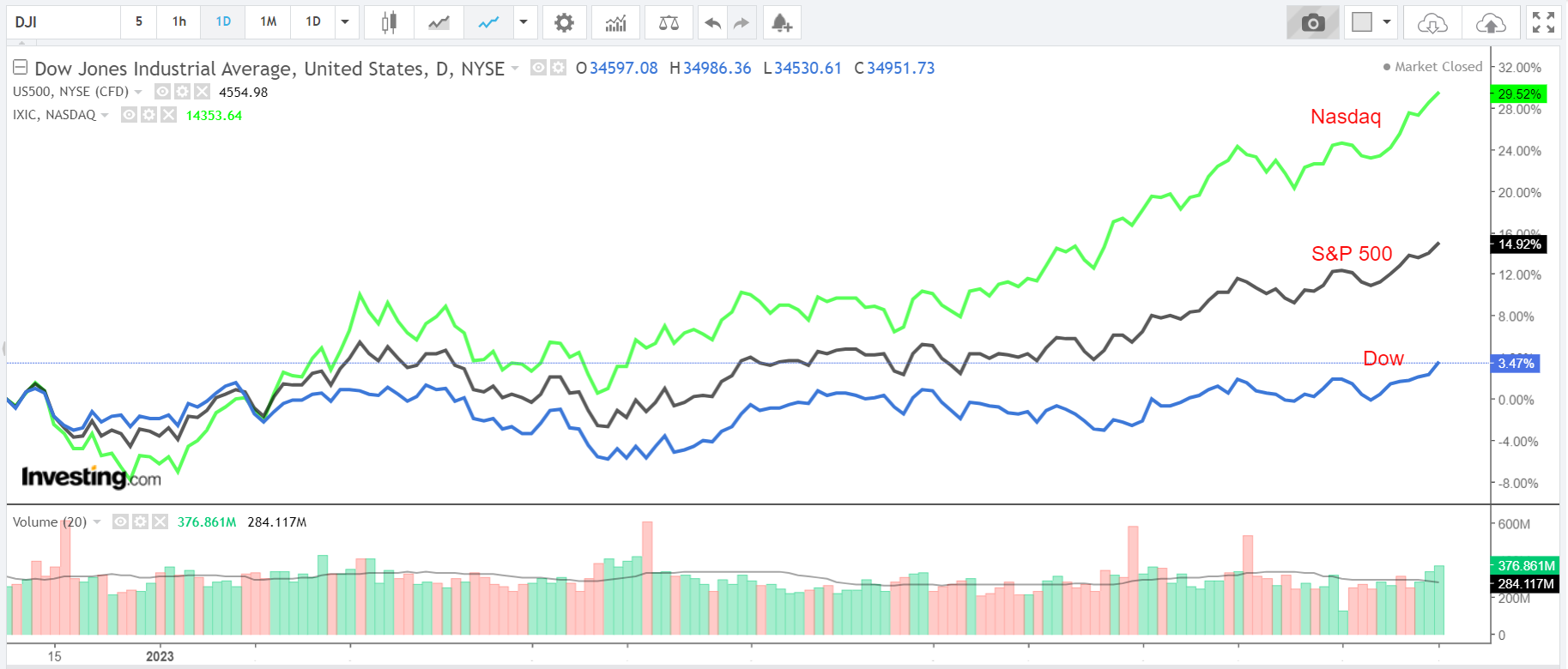 Despite widespread expectations of a potential U.S. recession this year, the economy has proven considerably more resilient than anticipated by many on Wall Street.
Despite widespread expectations of a potential U.S. recession this year, the economy has proven considerably more resilient than anticipated by many on Wall Street.
In fact, the Atlanta Fed's influential GDP Now tracker has the U.S. economy growing at an annualized 2.4% pace in the second quarter, slightly higher than its prediction of 2.3% a week earlier.
As such, here are five high-quality stocks worth owning amid the growing view that the economy will manage to dodge a recession.
1. Home Depot
- *Year-To-Date Performance: +0.3%
- *Market Cap: $318.5 Billion
Home Depot (NYSE:HD) has been riding high lately, with shares of the retail giant rising by almost 10% since mid-April, as investors scale back their expectations for a mild recession this year, thanks to the resilience of the U.S. consumer.
The Atlanta, Georgia-based company is the largest home improvement retail chain in the United States, supplying an assortment of building materials, construction products, and providing various services.
HD stock, which hit a five-month high last week, settled at $316.76 on Tuesday. At current levels, Home Depot commands a valuation of $318.5 billion.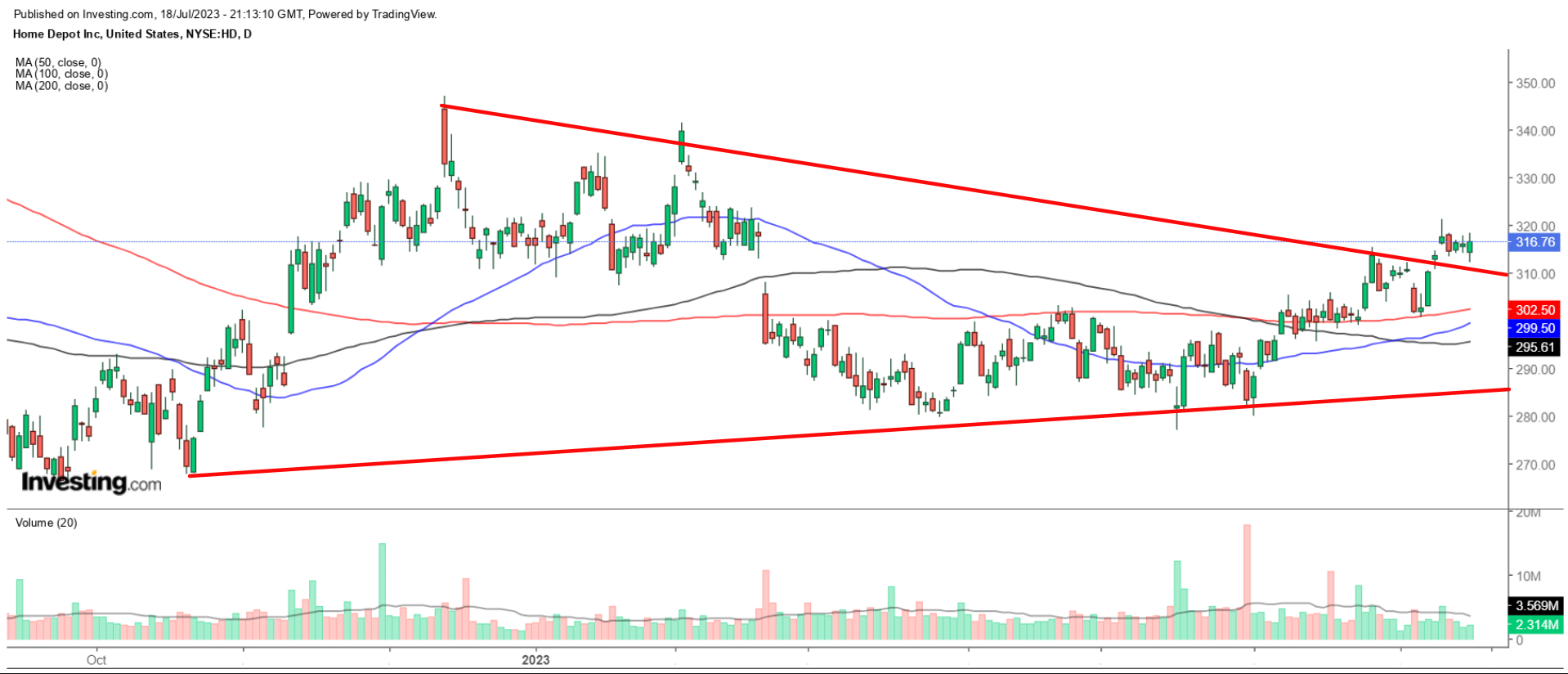
Not surprisingly, HD stock is substantially undervalued according to the quantitative models in Investing Pro: with a ‘Fair Value’ price target of $360.45, Home Depot shares could see an upside of about 14% from current levels.
Additionally, Wall Street has a long-term bullish view on HD, with 35 out of 37 analysts surveyed by Investing.com rating the stock as either a ‘buy’ or a ‘hold’.
Furthermore, the home improvement retail chain has proven over time that it can sustain shifting economic conditions and still provide investors with solid payouts thanks to its dependably profitable business model and rock-solid fundamentals.
Not only do shares of Home Depot currently yield a market-beating 2.65%, but the company has raised its annual dividend for 13 consecutive years, highlighting its exceptional track record when it comes to returning cash to shareholders.
Home Depot is projected to report earnings on August 15, and results are expected to get a lift from strong demand for its assortment of building materials and construction products from do-it-yourself customers. Wall Street sees the retail heavyweight earning $4.44 a share in the second quarter on sales of $42.1 billion.
2. Caterpillar
- *Year-To-Date Performance: +10.1%
- *Market Cap: $135.9 Billion
Caterpillar (NYSE:CAT) — widely considered as a bellwether for economic activity — is one of the world’s leading manufacturers of construction, mining, and energy equipment.
Shares of the industrial giant, which is one of the 30 components of the Dow Jones Industrial Average, are up more than 17% in the past three months amid optimism over the resilience of the global economy and as traders increasingly factor in a prompt end to the Fed’s tightening cycle.
CAT stock ended Tuesday’s session at $263.81, less than 1% away from setting a new all-time high. At current levels, the Deerfield, Illinois-based heavy machinery maker has a market cap of $135.9 billion.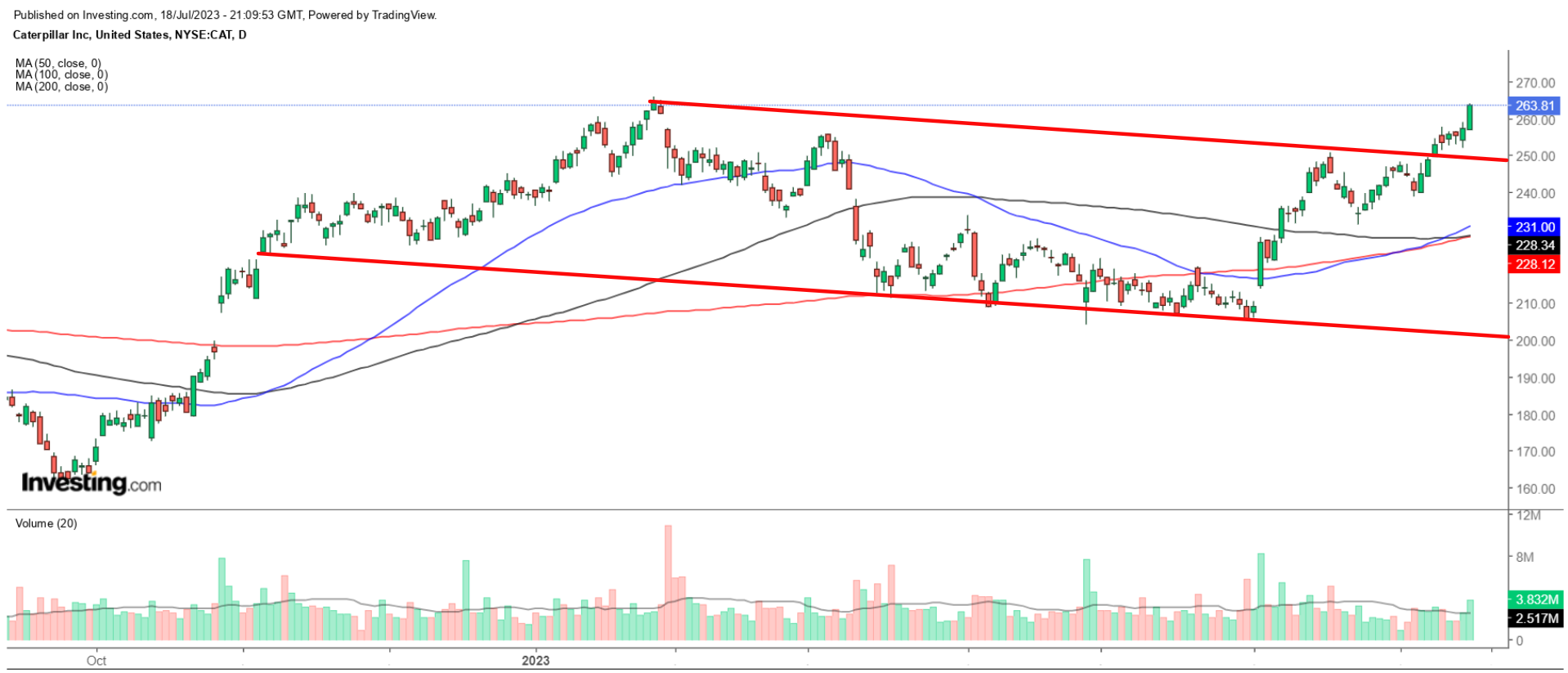
Caterpillar is forecast to deliver strong profit and sales growth when it reports second-quarter earnings before the U.S. market opens on Wednesday, August 2.
In a sign of increasing optimism, EPS estimates have seen 18 upward revisions in the past 90 days as it benefits from favorable industry demand trends given the promising outlook for construction and mining machinery sales.
Consensus estimates call for Caterpillar to report a profit of $4.57 per share, jumping 43.7% from EPS of $3.18 in the same quarter a year earlier. Revenue is forecast to rise 15.9% from the year-ago period to $16.52 billion, reflecting robust demand for its wide array of construction, mining, and energy equipment.
If those figures are confirmed, it would mark Caterpillar’s second-highest quarterly profit and sales totals in history, demonstrating the strength and resilience of its operating business as well as strong execution across the company.
Despite strong year-to-date gains, it should be noted that Caterpillar’s stock is still undervalued according to several valuation models on InvestingPro: the average ‘Fair Value’ price target for CAT stands at $277.98, a potential upside of 5.4% from the current market value.
3. American Express
- *Year-To-Date Performance: +20.5%
- *Market Cap: $132.2 Billion
Between its attractive valuation, encouraging fundamentals, dependably profitable business model and enormous cash pile, I believe that shares of American Express (NYSE:AXP) are well worth buying amid the current market backdrop.
Shares of the New York City-based credit card giant, which is one of Warren Buffett’s Berkshire Hathaway’s top stock holdings, have been on the front foot lately, gaining roughly 10% over the past three months.
AXP closed at $178.04 last night, putting it within sight of its February 2022 record high of $199.55. At current valuations, Amex has a market cap of $132.2 billion.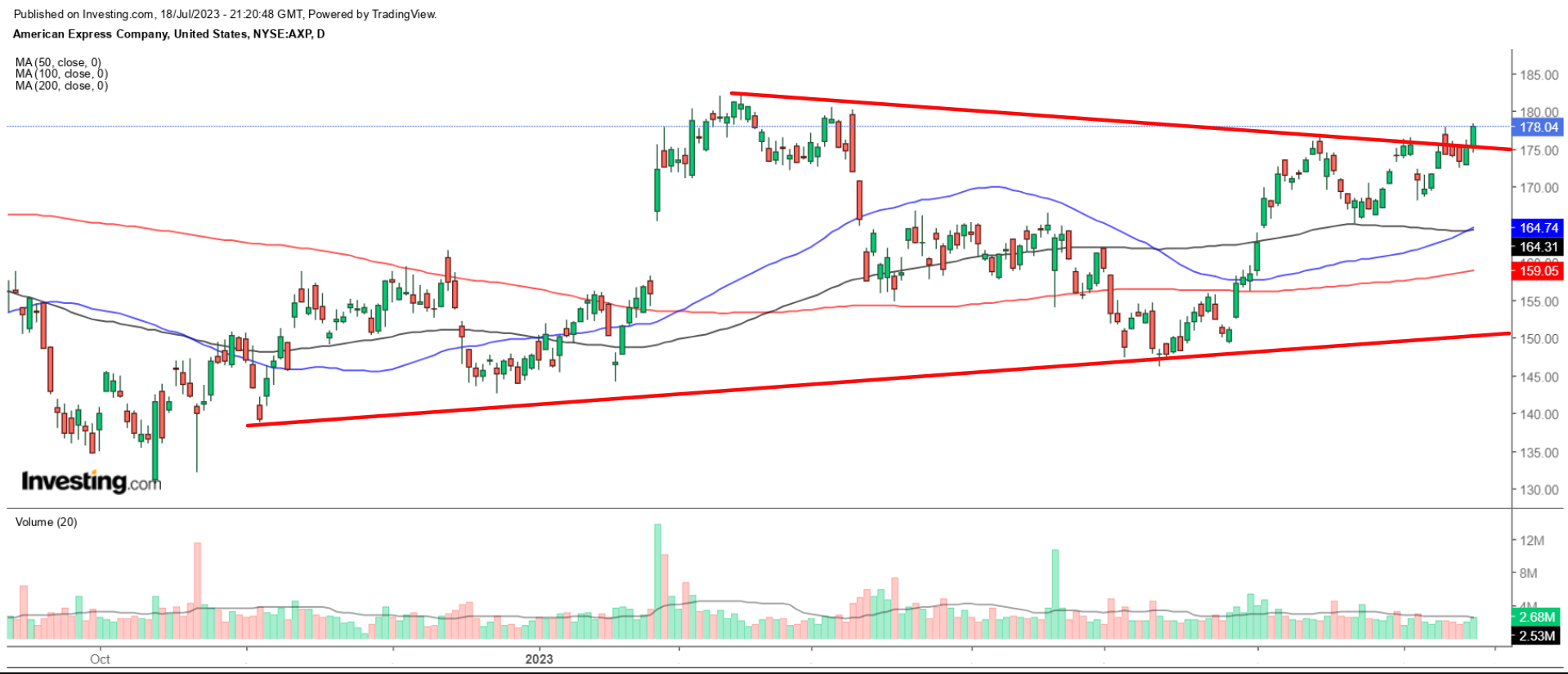
According to the InvestingPro model, AXP stock is still relatively undervalued and could see an increase of 16.9% from current levels, bringing it closer to its fair value of $208.17 per share.
American Express is forecast to deliver upbeat profit and sales growth when it reports second-quarter financial results on August 15.
As could be expected, Wall Street analysts are extremely optimistic ahead of the print, with analysts increasing their EPS estimates 13 times in the past 90 days, compared to four downward revisions.
Consensus calls for earnings of $2.82 per share, improving 9.7% from EPS of $2.57 in the year-ago period, while revenue is forecast to increase 14.6% annually to $15.36 billion.
If those figures are confirmed, it would mark the best quarter in Amex’s 173-year history thanks to its formidable credit card business and wide range of financial services.
4. FedEx
- *Year-To-Date Performance: +51.2%
- *Market Cap: $64 Billion
FedEx (NYSE:FDX), which is best known for its air delivery service, FedEx Express, is one of the biggest freight & logistics companies in the world. The shipping giant, which was founded in 1971 and is based in Memphis, Tennessee, is viewed as a barometer of the global economy, and it is highly sensitive to monetary conditions.
Shares have been on a tear recently, rising about 15% since mid-April thanks to a favorable fundamental outlook as it starts to reap the benefits of its ongoing operational restructuring actions, portfolio adjustments, and cost-cutting measures.
FDX stock ended at $261.97 on Tuesday, the strongest level since January 2022, earning the package delivery company a valuation of $64 billion.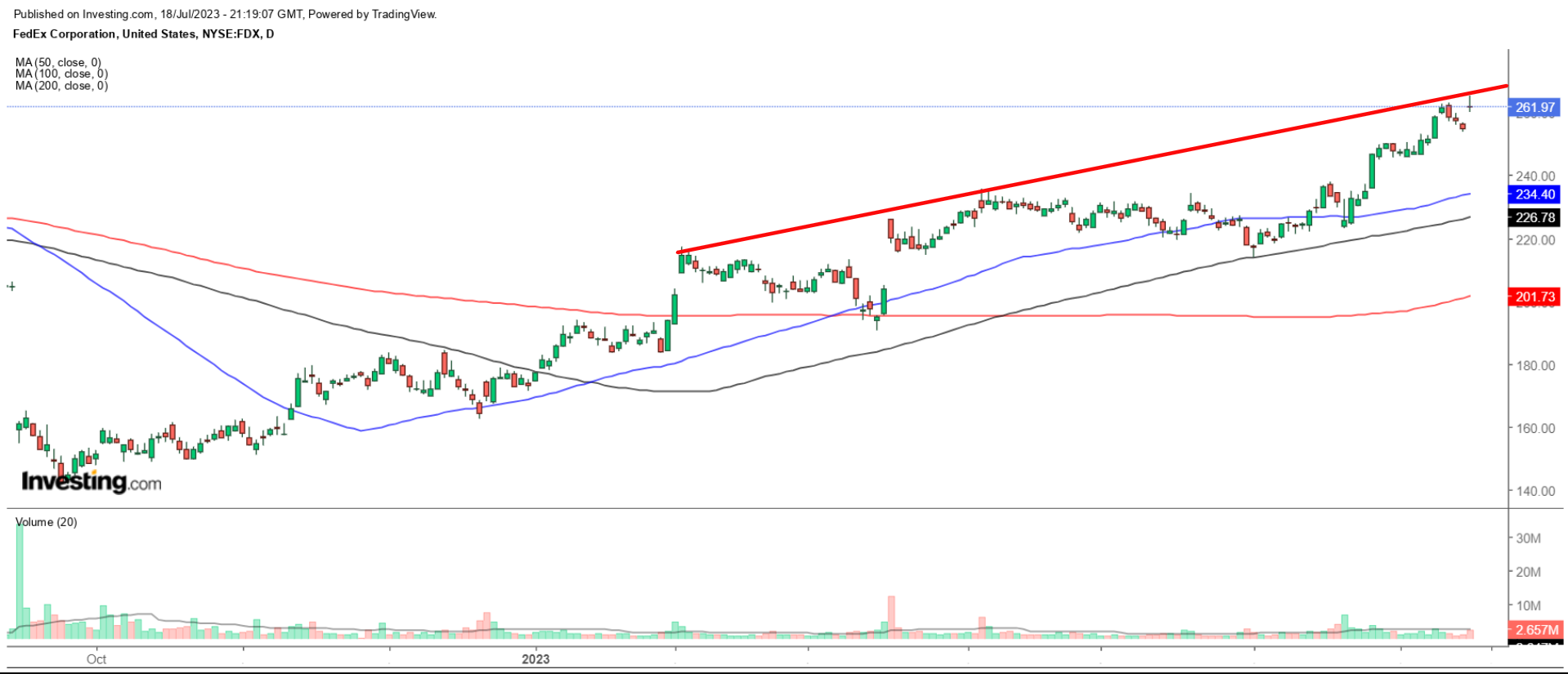 Unsurprisingly, the average fair value for FDX stock on InvestingPro according to a number of valuation models - including P/E multiples - points to a 21.6% upside from the current market value to $318.50/share.
Unsurprisingly, the average fair value for FDX stock on InvestingPro according to a number of valuation models - including P/E multiples - points to a 21.6% upside from the current market value to $318.50/share.
Investor sentiment was lifted last month, when FedEx announced fiscal fourth-quarter earnings which easily topped views, thanks in large part to ongoing operational restructuring actions and cost-cutting measures.
“The solid close to the fiscal year demonstrates the significant progress Team FedEx has made in advancing our global transformation while adapting to the dynamic demand environment,” President and CEO Raj Subramaniam said in the earnings release.
The company also said it would buy back $2 billion of its common stock in the new fiscal year. In addition, given FedEx’s nearly 20-year track record of paying a dividend, income-seeking investors should like it, too.
5. Best Buy
- *Year-To-Date Performance: +4.2%
- *Market Cap: $18.2 Billion
Best Buy (NYSE:BBY) is one of America’s largest tech gadget retailers, operating more than 1,100 stores across the country. Shares have seen increased buying activity lately, climbing 13% in the past three months to reach their highest level since February amid optimism over the health of the economy and the U.S. consumer.
I believe Best Buy’s stock should continue appreciating in the months ahead as the economy holds up better than expected and investors dial back expectations for future rate hikes amid easing inflationary pressures.
BBY closed at a five-month peak of $83.57 last night, earning the Richfield, Minnesota-based tech gadget retail chain a market cap of $18.2 billion.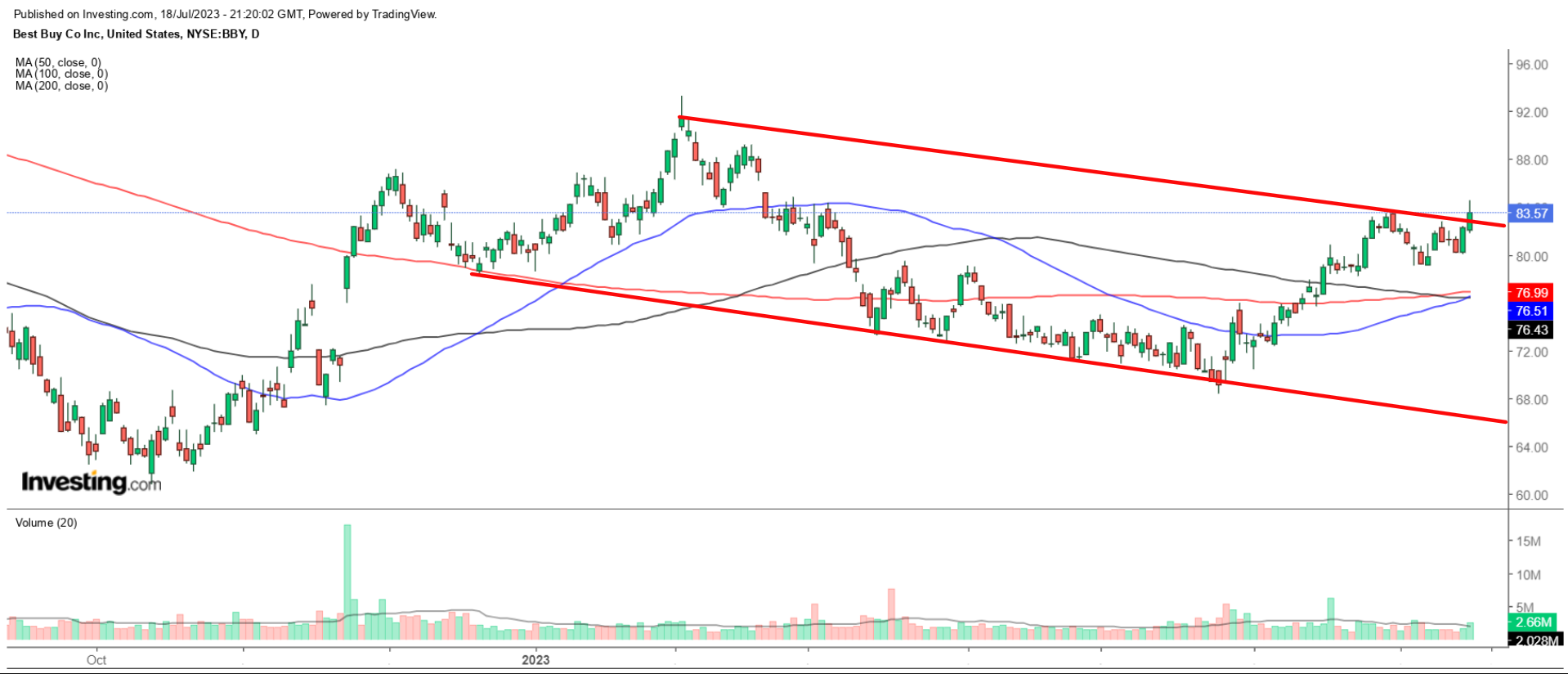
Even with the recent upswing, shares remain extremely undervalued at the moment, according to the quantitative models in InvestingPro, and could see an increase of roughly 29% from current levels.
The next major catalyst is expected to arrive when the consumer electronics retailer reports second-quarter financial results next month. Consensus estimates call for earnings per share of $1.07 on revenue of $9.51 billion as shoppers continue to spend on televisions, tablets, and computers.
Demonstrating the resilience of its business, Best Buy has either beaten or matched Wall Street’s top line expectations for 33 straight quarters dating back to Q2 2015.
In addition to its encouraging fundamentals, Best Buy remains committed to returning additional capital to its investors in the form of increased cash dividends and share repurchases, regardless of economic conditions.
In fact, Best Buy has increased its annual dividend for five years in a row, and shares currently yield 4.47%, more than triple the implied yield for the S&P 500 index, which is 1.44%.
***
With InvestingPro, you can conveniently access a single-page view of complete and comprehensive information about different companies all in one place, eliminating the need to gather data from multiple sources and saving you time and effort.
As part of the InvestingPro Summer Sale, you can now enjoy incredible discounts on our subscription plans for a limited time:
- Monthly: Save 20% and gain the flexibility to invest on a month-to-month basis.
- Yearly: Save a jaw-dropping 50% and secure your financial future with a full year of InvestingPro at an unbeatable price.
- Bi-Yearly (Web Special): Save an astonishing 52% and maximize your returns with our exclusive web offer.
Don't miss out on this limited-time opportunity to access cutting-edge tools, real-time market analysis, and expert insights. Join InvestingPro today and unlock your investing potential. Hurry, Summer Sale won't last forever!
Disclosure: At the time of writing, I am long on the S&P 500, and the Nasdaq 100 via the SPDR S&P 500 ETF (SPY (NYSE:SPY)), and the Invesco QQQ Trust ETF (NASDAQ:QQQ). I am also long on the Technology Select Sector SPDR ETF (NYSE:XLK). I regularly rebalance my portfolio of individual stocks and ETFs based on ongoing risk assessment of both the macroeconomic environment and companies' financials.
The views discussed in this article are solely the opinion of the author and should not be taken as investment advice.
